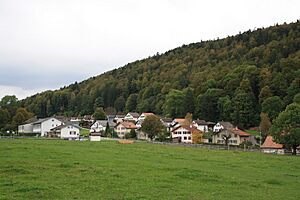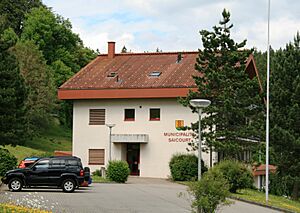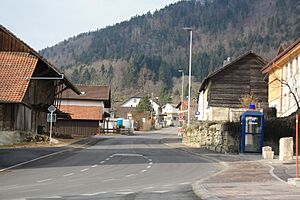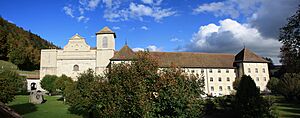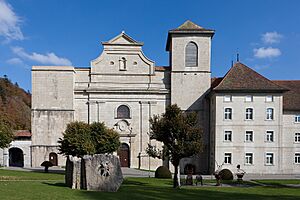Saicourt facts for kids
Quick facts for kids
Saicourt
|
||
|---|---|---|
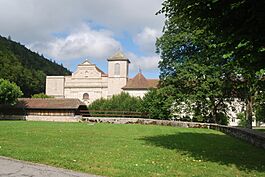
The church of the former Bellelay Abbey in Saicourt municipality
|
||
|
||
| Country | Switzerland | |
| Canton | Bern | |
| District | Jura bernois | |
| Area | ||
| • Total | 13.77 km2 (5.32 sq mi) | |
| Elevation | 749 m (2,457 ft) | |
| Population
(Dec 2020 )
|
||
| • Total | 645 | |
| • Density | 46.84/km2 (121.32/sq mi) | |
| Postal code |
2732
|
|
| Localities | 2712 Le Fuet, 2713 Bellelay, La Bottiere, Montbautier | |
| Surrounded by | Tramelan, Mont-Tramelan, Tavannes, Reconvilier, Saules, Sornetan, Châtelat, Lajoux, Les Genevez | |
Saicourt is a small town, also called a municipality, located in the Jura bernois area of the canton of Bern in Switzerland. It's a French-speaking region known as the Bernese Jura. Saicourt includes smaller communities like Le Fuet, Bellelay, La Bottiere, and Montbautier.
Contents
- Saicourt's Past: A Look at Its History
- Saicourt's Landscape: Exploring Its Geography
- Saicourt's Symbol: The Coat of Arms
- Who Lives in Saicourt: Demographics
- Important Buildings: Heritage Sites
- Saicourt's Economy: How People Make a Living
- Faith and Community: Religion in Saicourt
- Learning in Saicourt: Education
- See also
Saicourt's Past: A Look at Its History
Saicourt was first mentioned in old records way back in 1262. It was called Zacurt then.
How Bellelay Abbey Shaped Saicourt
A very old monastery called Bellelay Abbey was built nearby in the Bellelay valley in 1140. This Abbey owned much of the land and had rights in Saicourt for many years. However, Saicourt and Le Fuet were also connected to the provost of Moutier-Grandval. This was under the rule of the Prince-Bishop of Basel, who was both a religious leader and a ruler.
Becoming an Independent Town
In 1798, France invaded Switzerland. After this, Bellelay Abbey was no longer a religious institution and its lands became public. Saicourt then became its own independent town. It was first part of a French area called Département of Mont-Terrible. Later, in 1800, it joined the Département of Haut-Rhin. After Napoleon was defeated and the Congress of Vienna meeting in 1815, Saicourt became part of the Canton of Bern.
Changes in Population and Religion
During the 1700s, some German-speaking Anabaptists, a group with specific religious beliefs, moved to the village of Montbautier. Saicourt and Le Fuet were part of the Tavannes-Chaindon parish (a church district) until 1928. After that, Le Fuet and Bellelay joined the Tavannes parish, while Saicourt became part of the Reconvilier parish. A Swiss Reformed chapel was built in Le Fuet in 1938.
From Cheese to Clinics: Saicourt's Economy Over Time
For a long time, the main business in Saicourt was making Tête de Moine cheese at the Abbey. This cheese is still famous today! In the 1700s, people also started making watches and digging for silica sand. Peat (a type of fuel from decayed plants) was also cut in Bellelay and La Bottière.
By the early 1900s, watchmaking and sand mining stopped. Peat production ended in 1945. In 1899, Bellelay Abbey was turned into a special clinic for mental health. This clinic has grown to be the biggest employer in Saicourt. In 2008, 341 people worked there.
Saicourt's Landscape: Exploring Its Geography
Saicourt covers an area of about 13.75 square kilometers (5.3 square miles). A large part of this land, about 44.8%, is used for farming. Forests cover about 50% of the area.
About 4.4% of the land is built up with buildings and roads. A tiny bit, 0.1%, is rivers or lakes. The rest, about 0.9%, is land that can't be used for farming or building.
Most of the forested land is dense forest, and a small part has orchards or groups of trees. For farming, some land is used for crops, a lot is for pastures where animals graze, and some is for alpine pastures high in the mountains. All the water in Saicourt is flowing water, like streams and rivers.
The municipality is located in the Trame, Le Fuet, and Bellelay valleys. It includes the main village of Saicourt and smaller communities called hamlets, such as La Bottière and Montbautier.
In 2010, Saicourt joined a new administrative district called Jura bernois.
Saicourt's Symbol: The Coat of Arms
The blazon (description) of Saicourt's municipal coat of arms is: Or on a Pale Gules an Abbot's Crozier of the first issuant from a Mount of 3 Coupeaux vert. This means it has a golden background with a red stripe down the middle. On the red stripe, there's a golden staff (an Abbot's Crozier) coming out of three green hills. This symbol connects to the area's history with Bellelay Abbey.
Who Lives in Saicourt: Demographics
Saicourt has a population of about 603 people (as of December 2011). In 2010, about 3.7% of the people living there were foreign nationals. Over the past ten years (2001-2011), the population has grown slightly by 1.7%.
Languages Spoken in Saicourt
Most people in Saicourt speak French as their main language (about 84%). German is the second most common language (about 12.6%), and Italian is third (about 1.5%).
Where People Come From
In 2000, about 32.5% of the people in Saicourt were born there. About 31.8% were born in the same canton (Bern). Around 15.2% were born elsewhere in Switzerland, and 7.9% were born outside of Switzerland.
Age Groups in Saicourt
As of 2011, children and teenagers (0–19 years old) make up about 25.5% of the population. Adults (20–64 years old) make up 61.5%, and seniors (over 64 years old) make up 12.9%.
Family Life in Saicourt
In 2000, about 32.5% of the adults in Saicourt were single and had never been married. About 289 people were married.
Housing in Saicourt
In 2000, most apartments (78.7%) were lived in all the time. Some (14.7%) were used only at certain times of the year, and a few (6.6%) were empty. In 2011, single family homes made up about 60.2% of all the homes in Saicourt.
Population Changes Over Time
The chart below shows how Saicourt's population has changed over many years:

Important Buildings: Heritage Sites
The old Premonstratensian Bellelay Abbey is a very important historical site in Switzerland. It's listed as a heritage site of national significance. The entire Abbey area is part of the Inventory of Swiss Heritage Sites, meaning it's protected for its historical value.
The Abbey Church and Its Famous Cheese
The church at Bellelay Abbey is the second largest church in the Canton of Bern. The monks who lived at the Abbey were the ones who created the famous “Tête de Moine” cheese!
Bellelay's Hospital: A Major Employer
The psychiatric clinic in Bellelay is located in Saicourt. It was started in 1891 when the Canton of Bern bought Bellelay Abbey and turned it into a clinic. Today, it's a very important place for healthcare and provides many jobs.
Saicourt's Economy: How People Make a Living
In 2011, Saicourt had a low unemployment rate of 1.04%. This means most people who wanted jobs had them. In 2008, there were 452 people working in the municipality.
Jobs in Different Sectors
- Primary Sector: About 45 people worked in farming and related businesses.
- Secondary Sector: About 17 people worked in manufacturing (making things) and construction (building things).
- Tertiary Sector: About 390 people worked in service jobs. This includes jobs in hotels, restaurants, education, and especially healthcare. A large number, 293 people, worked in healthcare.
Many people who live in Saicourt also work there. In 2000, 154 workers (about 40.2%) both lived and worked in Saicourt. Most people (59.8%) used a private car to get to work, while some (6.5%) used public transportation.
Taxes and Income
In 2011, the average tax rate for a married person with two children in Saicourt was 13.4%. For a single person, it was 19.7%. This is a bit lower than the average for the whole Canton of Bern.
Faith and Community: Religion in Saicourt
Based on the 2000 census, about 56% of the people in Saicourt belonged to the Swiss Reformed Church. About 19.6% were Roman Catholic. There were also smaller numbers of people who belonged to other Christian churches, Islam, or other faiths. About 5.79% of the population did not belong to any church.
Learning in Saicourt: Education
In Saicourt, about 54.6% of the population has finished non-mandatory upper secondary education. This means they continued their schooling after the required years. About 12.4% have gone on to higher education, like university or a specialized college.
The School System in Bern
The Canton of Bern has a specific school system:
- Kindergarten: One year of optional kindergarten.
- Primary School: Six years of required primary school.
- Lower Secondary School: Three years of required lower secondary school. Students are grouped based on their abilities.
After lower secondary, students can choose to continue their education or start an apprenticeship (learning a trade on the job).
Students in Saicourt Schools
During the 2011-12 school year, 132 students attended classes in Saicourt.
- Kindergarten: There was one kindergarten class with 10 students. Some of these students (30%) spoke a different language at home than in the classroom.
- Primary School: There were 2 primary classes with 40 students. About 17.5% of these students spoke a different language at home.
- Lower Secondary School: There were 5 lower secondary classes with 82 students. About 17.1% of these students spoke a different language at home.
In 2000, 144 students attended school in Saicourt. Most of them (88) lived and went to school in the municipality. Some students (56) came from other towns. Also, 16 residents of Saicourt went to schools outside the municipality.
See also
 In Spanish: Saicourt para niños
In Spanish: Saicourt para niños
 | Emma Amos |
 | Edward Mitchell Bannister |
 | Larry D. Alexander |
 | Ernie Barnes |





